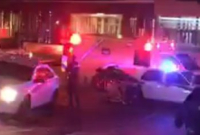Support strong Canadian climate journalism for 2025
What, exactly, does "tweak" mean?
The question consumed political Ottawa for days after Donald Trump, in a joint press conference Monday with Justin Trudeau, publicly stated he wants to "be tweaking" the U.S. trade relationship with Canada when it comes to renegotiating the North American Free Trade Agreement.
The dictionary says "tweak" means "to make fine adjustments."
But where Trump is concerned, "tweak" could well mean throwing into question Canada's regime for dairy, lumber and any number of carefully managed trade provisions that support Canadian business, the Conservatives warn.
Canada's ambassador to the United States, for his part, says it is difficult to know what to make of the phrase, because he has no one in authority to talk to: the key NAFTA players in Washington have yet to be fully confirmed.
Semantics aside, the Trump-Trudeau meetings may have a concrete impact on how the border works. The week was also notable for news on infrastructure spending, appreciation of women in the economy and attempts to deal with troubling racist undercurrents in Canadian society.
Here's how politics touched us this week:
The border
The Trump-Trudeau tete-a-tete produced a lengthy joint declaration that was short on details but long on aspirations — allowing the Trudeau contingent to declare the summit a success amid overwhelming uncertainty surrounding the Trump administration's intentions.
One area of the declaration went beyond hope and pointed to material progress: improved preclearance of people and goods going back and forth the Canada-U.S. border.
For now, travellers flying to American cities through eight major Canadian airports can clear customs in Canada before they leave, cutting down on time and hassle. Passenger pre-clearance is on deck for the Billy Bishop Toronto City Airport and Quebec City’s Jean Lesage International Airport, as well as for rail service in Montreal and Vancouver.
On Monday, Canada and the U.S. agreed to bring traveller preclearance to other as-yet-unnamed locations too. The countries also agreed to some preclearing of cargo on a pilot-project basis.
Public Safety Minister Ralph Goodale says he will follow up with bilateral meetings soon.
Women, bridges and budgetry
The latest edition of the supplementary estimates revealed this week that the government won't be able to hand out $828 million that was budgeted for infrastructure this year — a quarter of the allotted spending, and a recurring problem that most governments struggle with. The problem this time is that the Liberals are dependent on that money to spur growth in the economy, in turn delivering higher tax revenues back to the government to fund their future ambitions.
At the same time, the Finance Department is creeping ahead with a promise to incorporate gender analysis into its decision-making. It met recently with experts on evaluating how fiscal policies affect females — a "subgroup," according to Conservative leadership candidate Maxime Bernier — differently than males.
What happens when the two initiatives meet and officials need to grapple with the number of jobs created in the male-dominated construction industry? Will tweaking be required? Will the emphasis be put on the fact that women use bridges too? Or will the pace of the infrastructure spending speed up just as the gender analysis slows down so that the two never directly meet?
Islamophobia
In the wake of the Quebec City shooting of six people at a mosque last month, goodwill poured out across the country for the Muslim community and, amidst the sorrow and horror around the massacre, there was a widespread hope that the violence would jar Canadian society into some kind of post-racist tolerance.
But then came this week in Ottawa. A motion put forward by Liberal MP Iqra Khalid of Mississauga, Ont., called on parliamentarians to condemn and confront Islamophobia. In the overcharged atmosphere of partisanship in the House of Commons, sensitivities spilling over into Canada from the United States, and a Conservative leadership race that dips now and then into identity politics, the motion has now become toxic.
Conservatives have put forward their own motion that targets racism but not specifically Islamophobia; the Liberals are determined to show them up and are pushing their original motion unconditionally; Conservative leadership candidates are divided; and Khalid has become the victim of anti-Muslim vitriol.
So much for tolerance rising from the ashes.





Comments